The foundations have been dug, and the wooden planks inserted to firm up the sides. One week after the Feb. 5 demolition of the old wall that caused endless debate, everything is set to begin building the new one in King Petar Square in the north of Mitrovica. The new structure is due to be slightly lower, and two meters back from the old one, but unlike its predecessor, it is being built with the approval of both the Government of Kosovo and local institutions as part of approved plans for the so-called project for revitalizing the bridge over the River Ibar and the surrounding area.
The stalling attempts to revitalize the area come almost two decades after “the new bridge,” also known as the Ibar Bridge, was built with the aim of facilitating better connections between the Serb majority north of the city and the Albanian majority south. It might be one of the only bridges that instead of serving to connect, has come to symbolize division — all in a place that was once known as the city of rock, and which once united Kosovar Albanians and Serbs. The bridge, which was financed by the French government and built in 2001 during Kosovo’s post-war United Nations Mission in Kosovo (UNMIK) administration period, required the work of 61 Albanian and Serb workers. Their names, as well as the name of the French project manager, Pierre Lottici, are engraved in bronze on the internal part of the bridge to this day.
“They wrote the names as a sign of unity,” a bystander comments ironically to K2.0. Soon, this citizen from the south will be able to see the new King Petar Square across the bridge, whose failed symbolism he mocks.
The new pedestrianized square, replacing the existing road that leads from the Ibar Bridge and with the new wall as its basis, is named after King Petar I, himself hardly a symbol of unity; the last King of Serbia and first King of the Serbs, Croats and Slovenes is an important historical figure for Serbs for his role in bringing Kosovo — still considered by Serbia as its heart — within his Kingdom’s territory in the early 20th century, putting down any resistance in the process.
The overall revitalization project, that according to the Head of the EU Office in Kosovo, Nataliya Apostolova, will see King Petar Square become “the most beautiful square in Kosovo,” is one of four issues that were agreed upon in the so-called “historical” EU-backed agreement between Kosovo and Serbia in August 2015.
But in the eyes of the people of Mitrovica, in the north and south alike, it seems nothing about this is historical or interesting anymore. Just days after the original wall was destroyed, apathetic citizens offer a reminder that the city has many more problems that affect citizens more directly than walls and bridges that many view as being built for “political propaganda.” All they want is a good life.
“Better infrastructure, running water, a proper sewage system. These are basic things,” says a citizen in his 20s in the north of Mitrovica, listing his needs to K2.0 as he passes by the central Czar Lazar Square.
“Record me, but do not ask for my name,” is a common condition set out by many of the residents in the city’s north. While many are weary of the constant media attention that Mitrovica attracts whenever tensions are raised, others fear reprisals by illegal groups that instill fear in people who speak out ‘against Serb interests’ — whether it be about high politics or day to day issues such as a poor sewage system.
“Look at the unregistered cars and taxi cabs. They park all over the place. How can you even travel with a taxi cab that does not belong to a registered firm and has no license plates? How is this secure, and how does it guarantee safety, especially for children that go to school?” asks a man in his 40s. “I’ve been living in Mitrovica for 40 years now. I lived with Albanians as well and we never had problems up until 1999. My nextdoor neighbor was Albanian… we are tired of these political games,” he says, walking away, slowly.
A peer of his shares the same concerns. He doesn’t care about the wall and also describes the tension that surrounds him as “a political game.”
“Issues like this with the wall are only games about money and power, which are done behind the backs of ordinary people,” he says.
He talks of daily survival concerns and is nostalgic for the years preceding ’99. Mitrovica was once Yugoslavia’s mining center with the city’s Trepca factory employing about 40 percent of the city’s population alone. Today it is the poorest city in Kosovo, with an unemployment rate of about 70 percent. A city, north and south included, that was once a treasure for all of Yugoslavia, is now characterized by chaotic infrastructure, unpaved or half-finished roads, water shortages and a large population of stray dogs.
“In 2000, we had a whole lot of problems, but there was no wall in this city — we were the wall. [Now] this is just a political game. We have problems that are much more existential,” he says.
Normalizing the ‘not normal’
But speaking about these basic, everyday problems with local and state officials or politicians is not considered to be normal. Because Mitrovica itself is not considered to be normal.
As proof of ongoing tensions being part of daily life, as K2.0 walks around the city on the day that construction of the new wall is about to begin, attention is largely on the Democratic Party office of Marko Jaksic, which caught fire in the early hours of the morning. Jaksic has accused Serbia’s prime minister, Aleksandar Vucic, and his people in the north of Kosovo for this act, which occurred one day after Jaksic had heavily criticized Vucic about the whole scenario with the Mitrovica wall.
But the official version provided by Kosovo Police is that heaters caused the fire that destroyed the office. “We have engaged two experts, one institutional and one independent in order to remove any doubt, and according to their reports the fire was caused by two heaters which were left turned on throughout the night in the office,” is the verdict offered by North Mitrovica’s police spokesperson. “I would appeal for things not to become politicized as they often do in the north because this is causing unnecessary tension for citizens.”
“Mitrovica is different,” says Valdete Idrizi, one of Mitrovica’s most active activists since the war and director of Community Building Mitrovica, an NGO working in both the north and south of the city. “That is what they say to us: ‘You are different.’ Even the most banal things are related to politics here,” she says. “Things here are done according to orders that come from the top.”
Idrizi, originally from the north of Mitrovica, is one of the Albanians who were displaced in 1999; she has never returned to her family’s property. “My mother has moved from apartment to apartment, renting 11 in total in the south, because she cannot use her apartment in the north… because we were never a priority for our government in the first place. Because we are different, because we are Mitrovica,” she says.
According to Idrizi, high levels of unemployment and isolation as a result of visa restrictions are the main problems that unite Kosovo’s divided city more than any bridge or “revitalization” project can. “There is a widespread apathy, because many years have passed and whatever we’ve started to do for progress has been politicized or utilized by both parties – not only from the Belgrade side, but also from the Kosovo one,” she says.
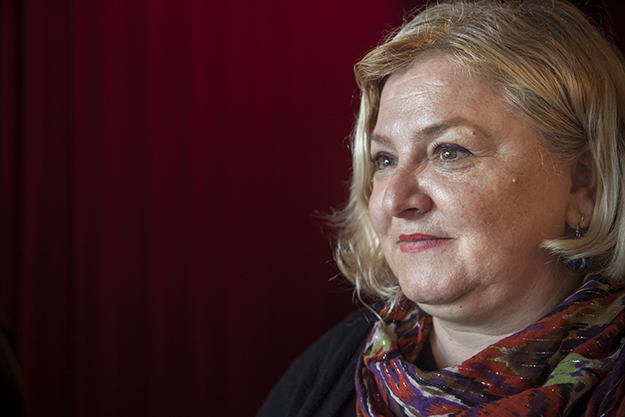
Valdete Idrizi says that decisions in Mitrovica are rarely taken genuinely at a local level, but instead according to “orders that come from the top.” Photo: Majlinda Hoxha / K2.0.
When thinking back to recall the period before the war and the time when she and her family lived in their property in the north of Mitrovica, she pauses. “I hesitate because there is a tendency to call us traitors or Yugoslavia nostalgics each time we recall that period,” she says with a sarcastic laugh. “But we lived well back then. People lived well. There are other families that had properties and apartments and now live in squalid collective centers in the south,” she goes on.
According to Idrizi, living in Mitrovica means always fearing that “something might happen.” “As citizens of Mitrovica, together with fellow citizens from the south or the north, we often joked when meetings were being held in Brussels. We’d say that if something doesn’t go well there, something will definitely happen here,” she says. “So we’ll always be a spare tire or a trampoline for the policies of the two states.” She says she is optimistic by nature, but that she does not believe that the process of revitalizing the Ibar Bridge or achieving conditions for free movement between north and south can happen while other basic issues go unaddressed.
Idrizi highlights that citizens in the north rarely feel able to address their everyday concerns to Kosovo’s institutions, while citizens in the south are also still dealing with the past. “There are certain bridges in the minds of people that are heavier than the metallic Ibar Bridge,” she says. “The hardest part is bringing back the people’s trust, because the war happened, and you cannot turn back time.”
But while bridges and walls continue to divide Mitrovica’s citizens, the market in the Bosnian Mahalla (neighborhood) of the city has perpetually united them. Serb and Albanian traders work together selling their merchandise in this neighborhood, which is mainly inhabited by Bosniaks. The Serbs speak Albanian, and the Albanians speak Serbian. Fruit, vegetables, food products, clothes, and even jewelry, all in one place. They do not care about the wall. “We have our work,” an Albanian worker tells K2.0 as she searches for a pair of cream colored high-heel shoes for her Serb client.
Unemployed but optimistic
It’s Saturday. During the weekends many citizens from the north of Mitrovica spend their days in Belgrade, visiting family and friends. But Dino, Vasko, Jovana and Nenad, all aged 20, decide to spend their Saturday with K2.0, drinking coffee near the central Czar Lazar Square.
The youngsters have no problem articulating their hopes and concerns in fluent English; they do not want to speak or hear about hatred and segregation.
They see the future in a united and peaceful Kosovo, one in which their parents and ancestors will also be convinced that the best way to coexist is in peace. They don’t care about the wall in King Petar Square — young people in Mitrovica have many bigger concerns, they say. They are unemployed, have no employment opportunities in the city that they live in, and they are isolated.
“The same roads, the same stores… it’s so boring here,” Dino says. “In the ’90s when Trepca was functional, families had jobs, and lived good lives. I want it to be like that again… No one asks us citizens what we want. The wall and these things are all propaganda from both parties. No one asked us when they built it, and no one asked us when they demolished it.”
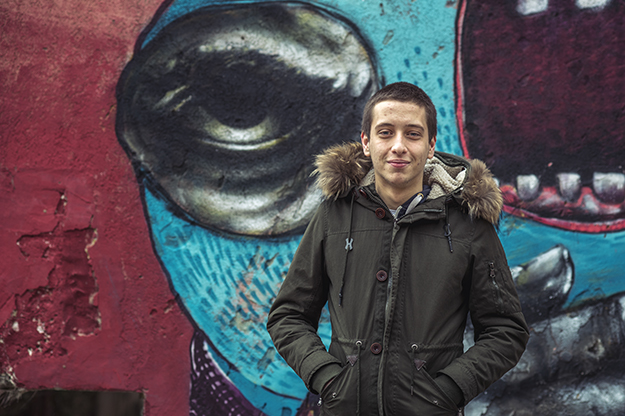
Dino says that citizens are not asked what they want and that both Serb and Kosovar Albanian politicians use Mitrovica for their own propaganda. Photo: Jonny Wrate / K2.0.
Dino and his peers do not have fond memories of the day Kosovo declared independence in 2008. They remember protests and tear gas in the streets of northern Mitrovica. For this they blame the local residents. “It’s like this: There are people that are ready to hurt themselves and say that ‘we do not accept your independence,’” Dino says. “‘So we’ll hurt ourselves and destroy our lives, but we will not accept independence.’ This is what I’ve seen and to be frank, it was anything but a feeling of independence. We must move forward.”
According to Jovana, no-one should live in the past. “We feel used by the politics of Belgrade and Kosovo,” she says. “The population in Kosovo, in the north and in the south alike, is in the same situation. There are problems with and complaints about everything, but no one is doing anything to change that.”
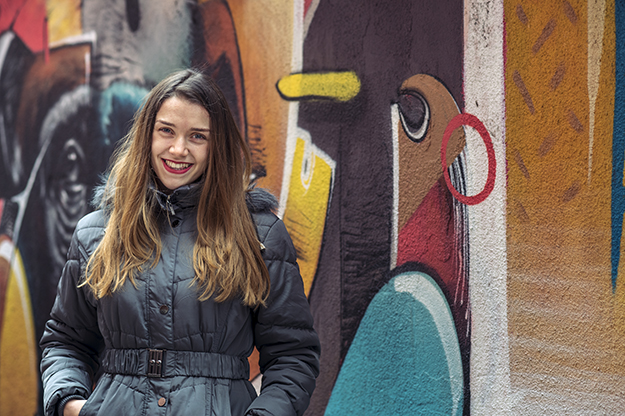
Jovana, originally from Prishtina, says that Kosovar Albanians and Serbs are in the same situation, with plenty of complaints but nobody doing anything about them. Photo: Jonny Wrate / K2.0.
Jovana was born in Prishtina, but her family was displaced at the end of the war in 1999, and she has never been back. “I’ve been to the south a few times for training,” she says. “They sent us to Prizren with a van. I don’t feel threatened by Albanians. I have made Albanian friends.”
As the youngsters pass through the city center accompanied by “foreigners,” they get a number of looks. Vasko stops by the park to pose for K2.0 next to some graffiti portraying the singer John Lennon; he says peace is what brings people together, regardless of whether there is a wall or a bridge between them.
Vasko thinks Majlinda Kelmendi is Kosovo’s best ambassador. “The one who won the Olympics,” he says, smiling. However he expresses his disappointment at the fact that no one is representing Kosovo as a whole. “Some Serbs and Albanians still live segregated from one another. I’d like to see people more united, and after nine years, I’d like to see Kosovo with a significantly lower level of unemployment, and with a better economy,” Vasko says.
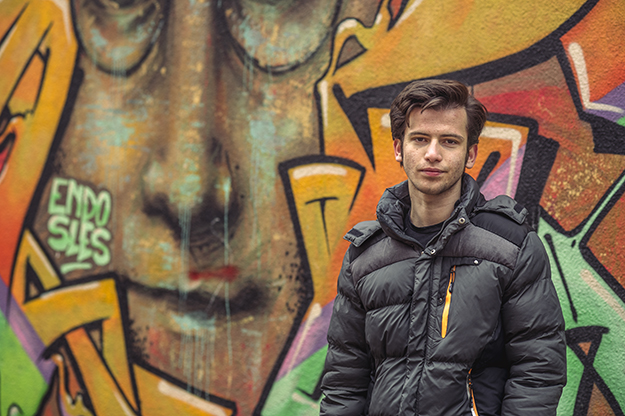
Vasko believes that Majlinda Kelmendi is Kosovo’s best ambassador but is frustrated that nobody represents Kosovo as a whole. Photo: Jonny Wrate / K2.0.
However, it’s hard for these youngsters to imagine their future in Kosovo. Dino wants to open his own business, but he says opportunities are limited. “If the economic situation does not change, I’ll go to Western Europe,” he says.
In the north of Mitrovica, there is no theater, cinema or sports hall, and education is provided in two ethnically-segregated schools. But no one, it seems, is looking to solve these problems — their attention always distracted.
Nenad believes young people in the north must not be affected by their parents or by radical groups. He thinks they should change their mindsets and live in peace: “Everyone complains about everything, but what do they do to change the situation? Nothing!”
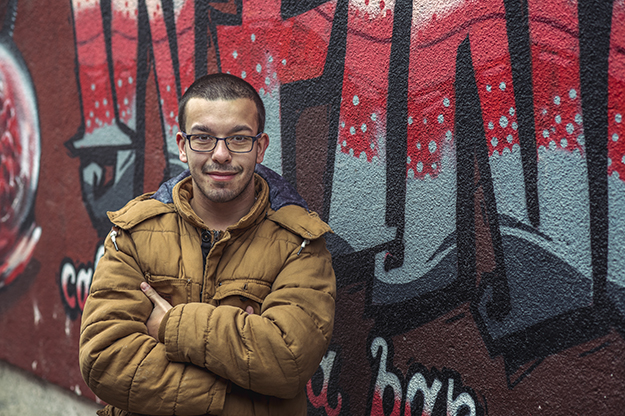
Nenad thinks that a mindset change is required for a more optimistic future in Mitrovica. Photo: Jonny Wrate / K2.0.
Dino believes that the same goes for Kosovar politics as a whole and for the Kosovo Assembly. “I’d vote in the national elections in Kosovo… if I had someone to vote for,” he says, laughing bitterly at the problems with the political classes that unite Serbs and Albanians. “The thing is, I, for example, know the parties that are in the Serb List, and I know their promises. But are they doing anything in reality? No. I know Hashim Thaci’s party, but is he doing anything for the citizens of Kosovo? No. Vetevendosje is damaging us by throwing tear gas for months on end, because of demarcation [of Kosovo’s border with Montenegro]. It turns out that they’re hampering the visa liberalization process. Now I ask you: Who should I vote for, even if I wanted to vote?”
But while the governments of Serbia and Kosovo discuss the long and slow process of normalization, the day-to-day frustrations of Dino and his friends hardly find space on the agendas of decision makers. In the meantime, the mining city that is guarded by a statue of Czar Lazar in the north, and a statue of Isa Boletini holding an Albanian national flag in the south, will continue to be united in their daily struggles.K
Featured image: Atdhe Mulla / K2.0.






